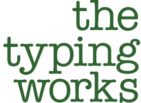How to Get the Most Out of Your Transcript when using professional services
When you invest in professional transcription services, you naturally want the final transcript to be as accurate, clear, and useful as possible. At The Typing Works, we pride ourselves on delivering top-quality transcripts that meet your specific needs. However, there are a few simple steps you can take to help us produce the best possible result. Here’s how you can get the most out of your transcript.
1. Provide a Clear and Detailed Specification
Before we start transcribing, it’s vital to communicate exactly what you need from your transcript. Think about:
- Speaker Labelling: Would you like speakers identified simply as “Speaker 1”, “Speaker 2”, etc., or by their full names or titles if known?
- Timestamps: Should timestamps be included at regular intervals or at every speaker change?
A properly considered specification gives our expert transcribers a clear framework to work from, saving time and ensuring your final document matches your expectations.
2. Consider Anonymisation Requirements
If your recording contains sensitive information, you might wish to anonymise certain details such as participant names, company names, or locations. Let us know in advance what needs to be anonymised. This not only ensures compliance with data protection regulations but also allows us to handle your content appropriately from the outset.
3. Ensure High-Quality Audio
Accurate transcription starts with clear audio. While our team is skilled at handling difficult recordings, the better the audio quality, the better the final transcript. Here are a few tips:
- Record in a quiet environment with minimal background noise.
- Use good quality microphones positioned close to the speakers.
- Encourage speakers to avoid talking over each other whenever possible.
Clear audio allows our transcribers to capture every word accurately, avoiding unnecessary gaps or guesswork.
4. Provide a Glossary of Industry-Specific Terms
If your recording involves technical discussions, legal language, medical terminology, or is full of acronyms and abbreviations, it’s extremely helpful to provide a glossary of terms beforehand. Having this information at hand:
- Reduces the chance of spelling errors or misinterpretations.
- Speeds up the transcription process.
- Ensures your transcript maintains industry credibility.
Even a simple list of commonly used terms can make a big difference.
5. Flag Any Potential Content Triggers
Certain content may be emotionally sensitive or distressing, depending on the topic. If your recording covers issues such as trauma, abuse, serious illness, or other potentially triggering subjects, please let us know. This allows us to allocate the most suitable and experienced transcriber for the project — someone who is comfortable handling the material with care, professionalism, and confidentiality.
Final Thoughts
Taking the time to prepare your transcription project with these factors in mind can dramatically improve the outcome. At The Typing Works, we’re committed to delivering exceptional service — and a little preparation on your part enables us to give you the best possible transcript, tailored exactly to your needs.
Ready to get started? Contact us today to discuss your transcription requirements!
